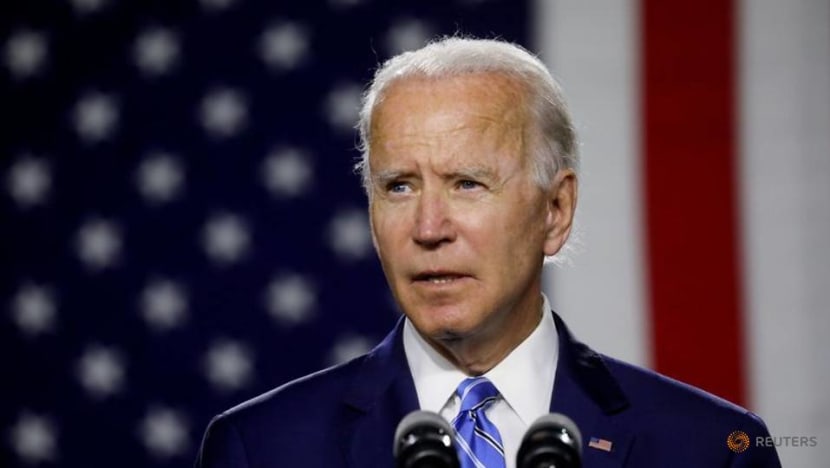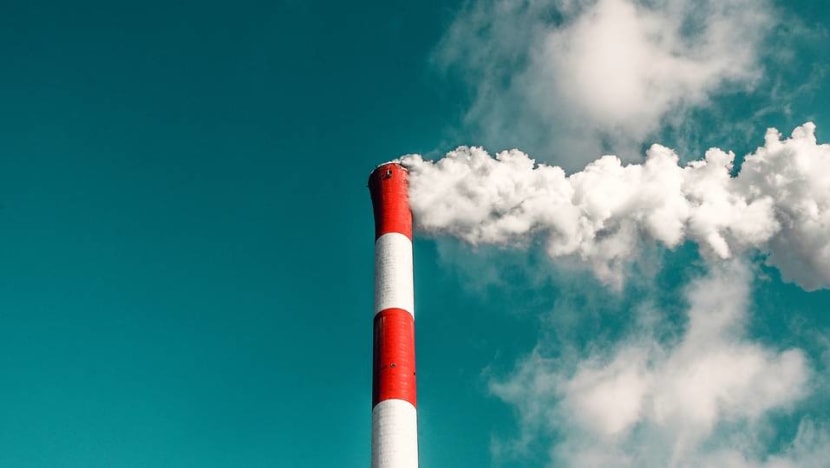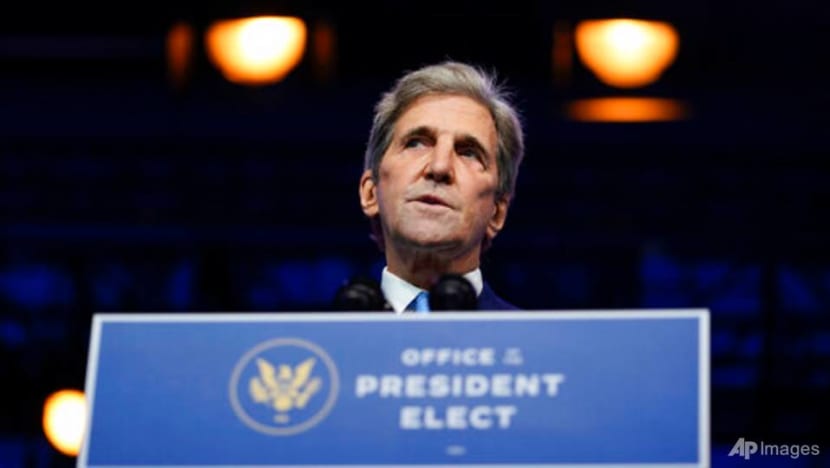commentary Commentary
Commentary: Joe Biden takes office in pivotal moment for climate action. Can he deliver?
For the first time ever, the Paris Agreement's 1.5 degrees Celsius limit is within striking distance, says Benjamin P Horton of the Earth Observatory of Singapore.

FILE PHOTO: Democratic U.S. presidential candidate and former Vice President Joe Biden arrives to speak about modernizing infrastructure and his plans for tackling climate change during a campaign event in Wilmington, Delaware, U.S., July 14, 2020. REUTERS/Leah Millis/File Photo
SINGAPORE: For the past four years, I have watched with dismay as Donald Trump’s administration progressively loosened oversight of polluting industries and eroded protections for wildlife.
The White House has rolled back more than 125 environmental safeguards to allow more pollution, drilling and logging.
Most significantly, Trump blocked Obama-era efforts to address Earth’s most daunting environmental threat: Climate change.
Calling climate change a “hoax” and claiming, “Science doesn’t know”, Trump made the US the first nation in the world to formally withdraw from the Paris Agreement, which he continues to insist was designed only to harm the US economy.
Trump announced this move in June 2017, but UN regulations meant that his decision only took effect on Nov 4, the day after the US election.
READ: Biden, UN chief discuss 'strengthened partnership' on COVID-19, climate
READ: Commentary: Why Singapore’s new 'absolute' climate mitigation targets could be an absolute game changer
HOPE FOR THE FUTURE
Fortunately, for the whole world, this catastrophic decision will be reversed.
The election of Joe Biden gives me hope for the future. I am not alone – a survey of nearly 900 international scientists prior to the election overwhelmingly wanted Biden to be elected the next US president.
The scientific community identified climate change and the US response to the COVID-19 pandemic as the main issues that have influenced who they support in this election.

Clearly, Biden’s immediate domestic priority will be to take personal charge of a fast, comprehensive and evidence-based effort to contain the coronavirus and protect the population’s health.
BIDEN’S NEXT STEPS ON CLIMATE ACTION
The next priority for Biden will be climate action. He ran on the most ambitious climate platform ever presented by a US presidential candidate, embracing many of the elements of his party’s Green New Deal.
Biden’s plan ensures the US achieves a 100 per cent clean energy economy by 2035, and net-zero emissions no later than 2050.
I hope he moves with the urgency required. It is evident the environment and economy are intertwined.
READ: Commentary: Forces of climate action are reshaping finance in Singapore and around the world
LISTEN: Getting Big Oil to make the big transition: Challenges and opportunities |EP 16
In 2020 alone, the US faced 16 climate disaster events with losses exceeding US$1 billion each. In addition, there were 12 land-falling hurricanes in the US, beating the previous record of nine set in 1916.
2020 is the sixth consecutive year (2015-2020) in which 10 or more billion-dollar weather and climate disaster events have impacted the US.
The 2015 Paris Agreement will be foremost for Biden, who has said he will rejoin the pact after taking office in January.
The central aim of the Agreement is to strengthen the global response to the threat of climate change by keeping global temperature rise this century well below 2 degrees Celsius, preferably 1.5 degrees Celsius, above pre-industrial levels.

But as important as rejoining the Paris Agreement is, a more significant demonstration of Biden’s determination will come in the form of the target that the US puts on the table, as its contribution toward meeting the goals of the Agreement.
STRUCTURAL CHANGES NEEDED
Although carbon dioxide emissions have fallen dramatically since lockdowns were imposed around the world due to the COVID-19 pandemic, we must build on this progress, not go backwards.
We need structural changes to the economy and industry, not just behavioural changes such as abstaining from flying, working from home and driving less.
Structural changes include investment in renewable energy, low-carbon infrastructure and plans to make buildings more energy-efficient.
READ: Commentary: Biden needs to build bridges, literally, in the US
READ: Commentary: US election - how much climate change and fracking played a role
Encouragingly, Biden campaigned on a US$2 trillion plan to boost clean energy, modernise infrastructure and curb greenhouse gas emissions.
Once in office, much will be spent over four years on upgrading 4 million buildings to make them more energy efficient.
Biden also wants to spend heavily on public transport, invest in electric vehicle manufacturing and charging points, and give consumers financial incentives to trade up to cleaner cars.
PARIS AGREEMENT WITHIN STRIKING DISTANCE
As a sign of the commitment to these policy objectives, John Kerry, the former US Secretary of State and Democratic presidential nominee, has been named as a special envoy on the climate crisis under the Biden-Harris incoming administration.
For the first time, climate change will have a seat on the US’ National Security Council. This elevation shows that the administration sees the climate crisis as an urgent national security issue.

Indeed, as Secretary of State, Kerry played a prominent role in the international effort to craft the Paris Agreement.
After Biden's election, the US, EU, China Japan, and South Korea – two thirds of the world economy accounting for over 50 per cent of global greenhouse gas emissions – would be committed to reaching net-zero greenhouse gas emissions by mid-century.
For the first time ever, this puts the Paris Agreement's 1.5 degrees Celsius limit within striking distance.
We could prevent small island states from sinking beneath the waves, avert the disasters of extreme weather for millions of people, and limit the chances of an ice-free Arctic in the summer.
READ: Commentary: We can no longer ignore the health risks of climate change in Asia
LISTEN: Colossal changes in our oceans in a rapidly warming world |EP 15
SCIENCE TAKES PRECEDENCE AGAIN
More generally, perhaps Biden’s election signifies that science will once again be the guide to environmental policy across the entire world.
The climate emergency is linked to a whole range of other problems such as water shortages, species extinction, air pollution and plastic waste that touch so many aspects of our lives and economy.
For example, we should recognise that the COVID-19 pandemic is the price the world is paying for ignoring warnings from scientists and activists about the need for humanity to reset its relationship with nature.
Experts have been warning us for decades that human activities were damaging the environment and disrupting wildlife habitats, making pandemics caused by diseases of animal origin more likely.

Some very significant changes in behaviour have occurred during the pandemic. For instance, the public has newfound appreciation for workers in healthcare and other essential sectors, such as in the food supply chain.
Research is needed to analyse and understand if the experience of the pandemic has changed attitudes, which can have a powerful influence over behaviour.
TOWARDS A FAIRER, HEALTHIER AND HAPPIER WAY OF LIFE
However, we should be realistic. 71 million people voted for Trump, and the Republican Party will most likely retain control of the Senate, potentially making it difficult for Biden’s administration to implement sweeping reforms.
Although individual actions and mass campaigns will still have essential parts to play, sustained change depends upon political leadership to formulate the right policies and carry them through.
READ: Commentary: The troubling truth behind China’s carbon neutrality pledge
We have seen how some countries, such as Singapore and New Zealand, have dealt with the pandemic better than others.
These countries have done this by listening to science, communicating transparently with empathy and care, creating and sustaining a trusting relationship between government and people, and long-term planning.
That’s exactly what’s needed for transforming into a sustainable modern society and addressing the climate emergency.
The divisiveness created by the Trump administration has made this difficult. Let us hope Biden and his team can find ways to bring the country together, reform old bipartisan alliances in the US, regain the trust of its international allies – and deliver.
READ: Commentary: America has a chance to repair diplomacy. Don't squander it
READ: Commentary: A US led by Joe Biden will focus on Asia and China
When the US emerges from the pandemic, the country has an opportunity to create a fairer, healthier and happier way of life for all its people.
That should be the legacy of the hundreds of thousands who have lost their lives to the pandemic in America.
While we have all read the very promising news regarding vaccines for COVID-19, we must remember that there is no vaccine for climate change.
Listen to an expert break down what a Biden presidency means for international climate action:
Benjamin P Horton is Director of the Earth Observatory of Singapore.














